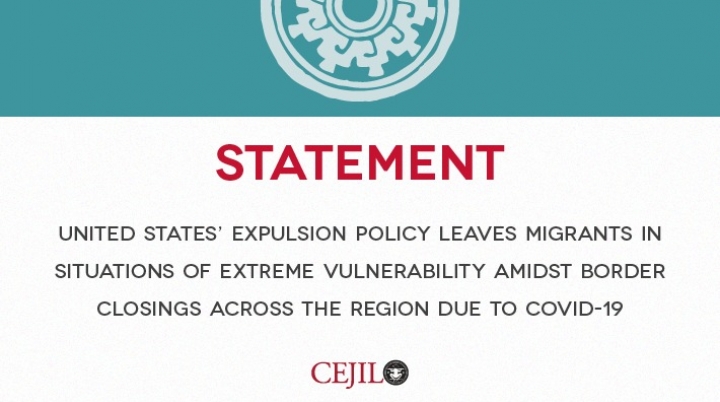COMUNICADOS
United States’ expulsion policy leaves migrants in situations of extreme vulnerability amidst border closings across the region due to COVID-19
May 20, 2020.- On May 14, the Center for Justice and International Law (CEJIL), the Latin America Working Group (LAWG), the National Immigration Project of the National Lawyers Guild (NIPNLG) and the Washington Office on Latin America (WOLA) presented an urgent appeal before the United Nations’ Rapporteur on the Human Rights of Migrants, Dr. Felipe González, requesting his intervention to address the ongoing grave harm to the life and integrity of migrants and asylum-seekers at the United States’ southern border as a result of the recent change in policy requiring summary expulsions of migrants.
In the context of the global coronavirus pandemic, on March 20, the United States adopted a new regulatory framework establishing a mechanism to suspend access of certain non-citizens to the United States for defined periods of time and under certain public-health-related conditions. The new regulation empowers the director of the Centers for Disease Control and Prevention (CDC), as a matter of public health, to issue orders prohibiting “[i]ntroduction into the United States of persons from a foreign country (..) so as to bring the person into contact with persons in the United States”.
With its new legal authority, the CDC issued an Order Suspending Introduction of Certain Persons from Countries where a Communicable Disease Exists. Specifically, this order suspends the introduction of persons lacking documentation that demonstrates their authorization to enter the United States from accessing the territory of the United States from its land borders with Mexico and Canada. The CDC Order, initially implemented for a thirty-day period, was extended once. Yesterday an extension was issued that stated that the order “shall remain in effect until the CDC Director determines that the danger of further introduction of COVID-19 into the United States from covered aliens has ceased to be a serious danger to the public health.”
With the application of this new policy, according to official government statistics, in March and April alone, more than 20,000 persons, including unaccompanied children, were expelled or denied admission to the United States on its southern border with Mexico. And, between March 21 and May 14, the U.S. government conducted only 59 screening interviews under the Convention Against Torture, with just two findings of reasonable fear.
The Regulation and the CDC Order leave no doubt that their effect is to prevent access of people without proper documentation to the United States and completely fail to guarantee that the prohibition on the introduction of non-citizens to the United States for public health reasons guarantee protects against refoulement. Under international law, non-refoulement is a principle that forbids a country receiving asylum seekers from returning them to a country or territory in which they would be in likely danger of persecution.
Also, the guidance provided to Customs and Border Protection (CBP) on how to implement the CDC Order makes no mention of refugee status determination procedures, and completely undermines the identification of individuals in need of protection under the Convention Against Torture by limiting the procedures to those persons “that make an affirmative, spontaneous and reasonably believable claim”. As CBP is also refusing to process asylum applicants at ports of entry, the U.S. government has exacerbated its contradictory stance of discouraging unauthorized crossings yet failing to provide regular channels for those seeking protection.
According to CBP, the first weeks of implementation of the regulation by way of the CDC Order led to more than 80% of people without proper documentation who arrived at the southern border being returned to Mexico within two hours of their arrival. With the application of this new policy, the United States has completely eliminated the possibility of seeking international protection on the border and forced vulnerable migrants to return to dangerous Mexican border towns where they lack safe shelter, food and water. In this context, the possibility of social distancing or hygiene practices aimed at preventing coronavirus contagions is almost non-existent.
Furthermore, there have been several documented cases of asylum seekers who have been expelled from the United States to Mexico’s northern border who are then subject to Mexican migration enforcement. Some of those asylum seekers have been detained and forcibly transferred to Mexico’s southern border, abandoned there or been forced to cross clandestinely into neighboring Guatemala despite border closures. Once in Guatemala, migrants face the risk of apprehension and detention due to transiting during curfew hours or must try to cross back into Mexico on their own. In this way, the regulation and CDC Order are leaving migrants and asylum seekers in situations of extreme vulnerability amidst border closings and tightened enforcement across the region due to the pandemic. The risks to their lives and integrity are tremendous.
Based on these, in the presentation of the urgent appeal the organizations asked the United Nations’ Rapporteur on the Human Rights of Migrants, among other things, to:
- Call on the United States to urgently re-establish asylum processing at the southern border in line with the principle of non-refoulement, guaranteeing procedures that protect the life, integrity and procedural rights of asylum seekers; and allow those asylum seekers who have been expelled to have an immediate opportunity to renew their asylum claim with the U.S;
- Call on the United States to immediately rescind the CDC order and the related regulation, suspending all summary expulsions pursuant to the new policies;
- Call on the United States to temporarily suspend all deportations, irrespective of their legality under domestic and international law, for the duration of the global pandemic for the coronavirus.
